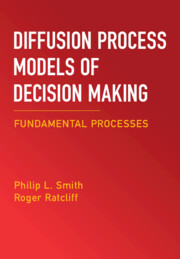Book contents
- Frontmatter
- Dedication
- Contents
- List of Figures
- Preface
- 1 Overview
- 2 Basic Concepts and Data
- 3 Sequential-Sampling Models of Decision Making
- 4 Obtaining Predictions for Diffusion Models
- 5 Empirical Assessment of Sequential-Sampling Models
- 6 Time-Varying Diffusion Models, I. Time Pressure, Urgency, Collapsing Boundaries, and Optimality
- 7 Diffusion Models for Time-Controlled Processing Tasks
- 8 Time-Varying Diffusion Models, II. Detection and Simple RT
- 9 Diffusion Processes Driven by Time-Varying Stimulus Representations in Visual Working Memory
- 10 Neural Diffusion Models, I. Network and Dynamical System Models
- 11 Neural Diffusion Models, II. Poisson Shot Noise and Related Models
- 12 Diffusion Models for Continuous-Outcome Decision Tasks
- 13 Response Confidence
- 14 EZ and Moment Models, Multialternative Decisions, and Expanded Judgment Tasks
- References
- Index
13 - Response Confidence
Published online by Cambridge University Press: 26 October 2025
- Frontmatter
- Dedication
- Contents
- List of Figures
- Preface
- 1 Overview
- 2 Basic Concepts and Data
- 3 Sequential-Sampling Models of Decision Making
- 4 Obtaining Predictions for Diffusion Models
- 5 Empirical Assessment of Sequential-Sampling Models
- 6 Time-Varying Diffusion Models, I. Time Pressure, Urgency, Collapsing Boundaries, and Optimality
- 7 Diffusion Models for Time-Controlled Processing Tasks
- 8 Time-Varying Diffusion Models, II. Detection and Simple RT
- 9 Diffusion Processes Driven by Time-Varying Stimulus Representations in Visual Working Memory
- 10 Neural Diffusion Models, I. Network and Dynamical System Models
- 11 Neural Diffusion Models, II. Poisson Shot Noise and Related Models
- 12 Diffusion Models for Continuous-Outcome Decision Tasks
- 13 Response Confidence
- 14 EZ and Moment Models, Multialternative Decisions, and Expanded Judgment Tasks
- References
- Index
Summary
Chapter 13 describes models of confidence, focusing on tasks in which a confidence judgment is given after a primary decision. These judgments present difficulties for two-boundary decision models because they assume that the quality of the evidence at the time of the decision, expressed as a likelihood or posterior probability, will be constant and cannot provide a basis for confidence. The chapter analyzes the effect of drift-rate variability on the posterior probability and shows that it is not constant but decreases with time. It then considers four alternative models for postdecision response confidence. The first is the balance-of-evidence model of Vickers, in which evidence for competing responses is accumulated separately. The second is the postdecision accumulation model of Pleskac and Busemeyer. The third is the weighted evidence visibility model of Hellmann and colleagues, in which confidence depends on both the accumulated evidence and stimulus visibility. The fourth is an implementation of a related idea using a spherical diffusion model. The chapter briefly discusses the RTCON and RTCON2 models of simultaneous confidence of Ratcliff and colleagues, which are considered in detail in Volume 2.
Information
- Type
- Chapter
- Information
- Diffusion Process Models of Decision MakingFundamental Processes, pp. 402 - 430Publisher: Cambridge University PressPrint publication year: 2025
